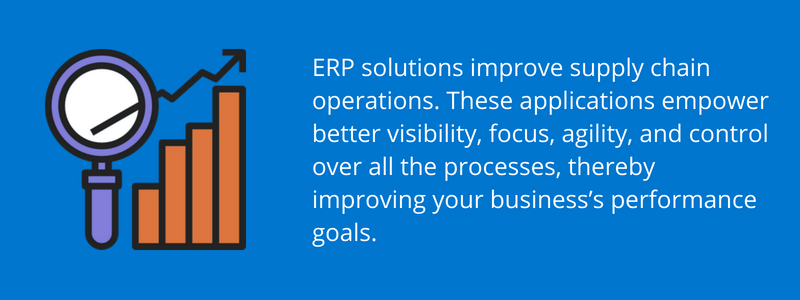Automate purchasing process
Keeping a tight track of inventory is important to avoid excess or shrinkage of stocks, but this monitoring is quite time-consuming. The advanced ERP systems enabled with supply chain management functionality can automate this process. The user gets notifications whenever inventory levels drop below a certain level. This helps staying informed about the need to refill the stock and accordingly place orders with vendors.
Greater data insight
The health of a supply chain greatly depends on accurate and timely information. New generation ERP system accommodates a huge amount of real-time data related to inventory, buying, selling, financial accounting, employees, and other core business functions. The software also allows users access to reports all the time resulting in greater insight into the operations, which makes managing of supply demands much easy.
Streamline core functions
ERP solution is comprehensive management software which can integrate and manage different business operations involved in a supply chain, such as HR, finance, management, sales, and so on through one single system. This reduces excessive manual paperwork and improves the enterprise-wide visibility of data. In addition, the system also enables automation, drastically reducing the processing and administration associated wait-times in the supply chain.
Establish process standardization
Having a standardized process is key to the success of any supply chain strategy. An ERP solution helps to build this uniformity across teams in single as well as multiple locations. This enhances the efficiency of the overall system, improves the process accuracy and teamwork, and reduces mistakes due to miscommunication.

Increase transparency
Implementing ERP solution enables management to have a consolidated view of every part of supply chain operations. It provides accurate, relevant, and up to date information about things like shipment in transit, where it is and when it will reach the warehouse. Also, the employees in the stores and in the warehouse can have a role-based access to this knowledge so that a consistent and accurate information is shared with all relevant people across the entire organization.
Real-time inventory management
Inventory is a critical part of any supply chain establishment. A proper management of it can decrease the cost at the same time increase the turnover of the business.
IIn the traditional method, inventory is captured using spreadsheets and hand checked lists. This lacks in providing error-free tracking and up to date data. On the other hand, a modern ERP software includes features that enable real-time visibility of exact inventory levels. As a result, the supply chain operates at the optimal with reduced overhead costs and order fulfillment communication mistakes.
Decrease delay
ERP system is a single source for all information. Hence, the tool provides businesses with greater data transparency and allows them to efficiently allocate resources including material, staff, and machines, right in the early planning stages. It enables better coordinated and executed activities, which result in on-time delivery across the supply chain.
Raise cost awareness
There are variable costs that incur in every stage of a supply chain. Intelligent ERP systems, by harnessing the supply and demand data, can generate more realistic cost projections. This prompts cost awareness among the managers, which enables them to pinpoint and reduce the uncontrollable factors incurring additional expenses, bring optimization in the processes and reduce operational costs.
Upgrade returns management
For logistics companies, supply chain processes dealing with returned goods and backorder processing is equally important as shipping products to customers. Effective ERP solutions make returns management easy. They allow businesses to have better control of the returned products with redoing of each process such as inspection, quality check, packaging, shelving, and so on. An upgraded return management system can help businesses to reduce waste and bring consistency in the backorder processing.
By now you must be aware of how an ERP system can improve your supply chain operations. Focus Softnet’s ERP solutions provide you with breakthrough features and unstoppable mobility. To learn more about how these work, click here and book a demo or consultation.








